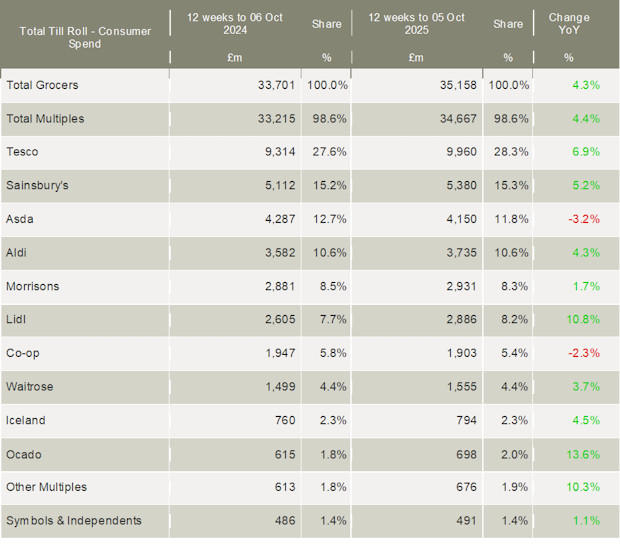Latest figures from Worldpanel by Numerator show take-home sales at UK supermarkets grew by 4.1% over the four weeks to 5th October, driven by grocery price inflation, which rose from 4.9% to 5.2%.
Spending on offers hit its highest level since April at 29.4% as consumers sought out deals to ease the burden on their wallets. This trend is expected to continue in the run-up to the festive season as retailers ramp up their promotions during the key trading period.
Worldpanel noted that online grocery sales grew by 12.0% compared with the same four weeks last year, making up 12.7% of the market – the highest share since March 2022. Over one in five households did their grocery shopping online at some point in September, marking a return to the popularity seen in the latter stages of the Covid pandemic.
Ocado remained the UK’s fastest-growing grocer over the 12 weeks to 5 October, with sales rising by 13.6% on the same period a year ago. The online retailer now holds a 2.0% share, matching its previous record high.
Lidl also saw double-digit sales growth (10.8%), taking the discounter’s market share to 8.2% – an increase of 0.5 percentage points, edging it closer to overtaking Morrisons.
Tesco again made the biggest share gain, climbing by 0.7 percentage points to take 28.3% of the market. Spending through its tills increased by 6.9%. Sainsbury’s saw its sales rise by 5.2%, lifting its market share to 15.3%.
Aldi maintained its 10.6% portion of the market after seeing spending in its stores rise by 4.3%. Waitrose’s share also remained stable at 4.4% after increasing sales by 3.7%, while sales of groceries at its key rival M&S were 7.7% higher.
Asda continued to lose share after recording a 3.2% drop in sales, while Morrisons recorded growth of just 1.7%.

Fraser McKevitt, head of retail and consumer insight at Worldpanel, highlighted that households are now juggling a lot of different things when choosing what and where to buy their groceries. Cost remains towards the top of the list as price rises accelerate, but the research group’s data reveals how consumers and retailers are also balancing concerns around health and sustainability.
At the beginning of this month, new regulations came into force in England restricting multibuy deals on products high in fat, salt or sugar (HFSS). McKevitt commented: “Retailers have had this HFSS legislation in their sights for several years, and they’ve been adapting, with consumer habits already shifting as a result. Three years ago, 28% of promotional spending on crisps was through multibuy offers but it’s come right down since then to just 8% in the month to 5th October. There’s a similar story in the cereal aisle with promotional spending on multibuy deals down from 18% to 5% during the same time period.”
On the subject of sustainability, new Worldpanel research shows that 50% of British shoppers believe that environmental issues are a critical threat to humanity, with the potential to shape the way they shop. McKevitt said: “People are worried about environmental issues, but the data uncovers a growing sense of pessimism among consumers about their ability to really make a difference. There’s an opportunity for brands and retailers who can make it easier to make sustainable choices, and people seem to be willing to adapt. One in two say they would accept plainer packaging for a product that they trusted was better for the environment, while 54% would even be willing to bring their own packaging.
“However, value for money is still a big consideration, and just 9% of people are happy to pay more for items that are better for the planet. Only 3% say they would compromise on quality. Interestingly, concerns about microplastics are on the rise, with over 40% of British households saying they are increasingly worried about the impact on their health.”
NAM Implications:
- Leading grocers growing share at the expense of Asda, Morrisons and Co-op…
- …has to be of constant concern to the three, despite constant driving for sales.
- Meanwhile, price inflation continues to grow value sales at the expense of volume.
- As consumers continue to shop around for deals (‘permanent’ changes in behaviour?)…
- …and (premium?) own label benefiting from diminishing brand premia.
- Going forward, the issue is to what extent fundamental changes in behaviour…
- …become ‘permanent’?



